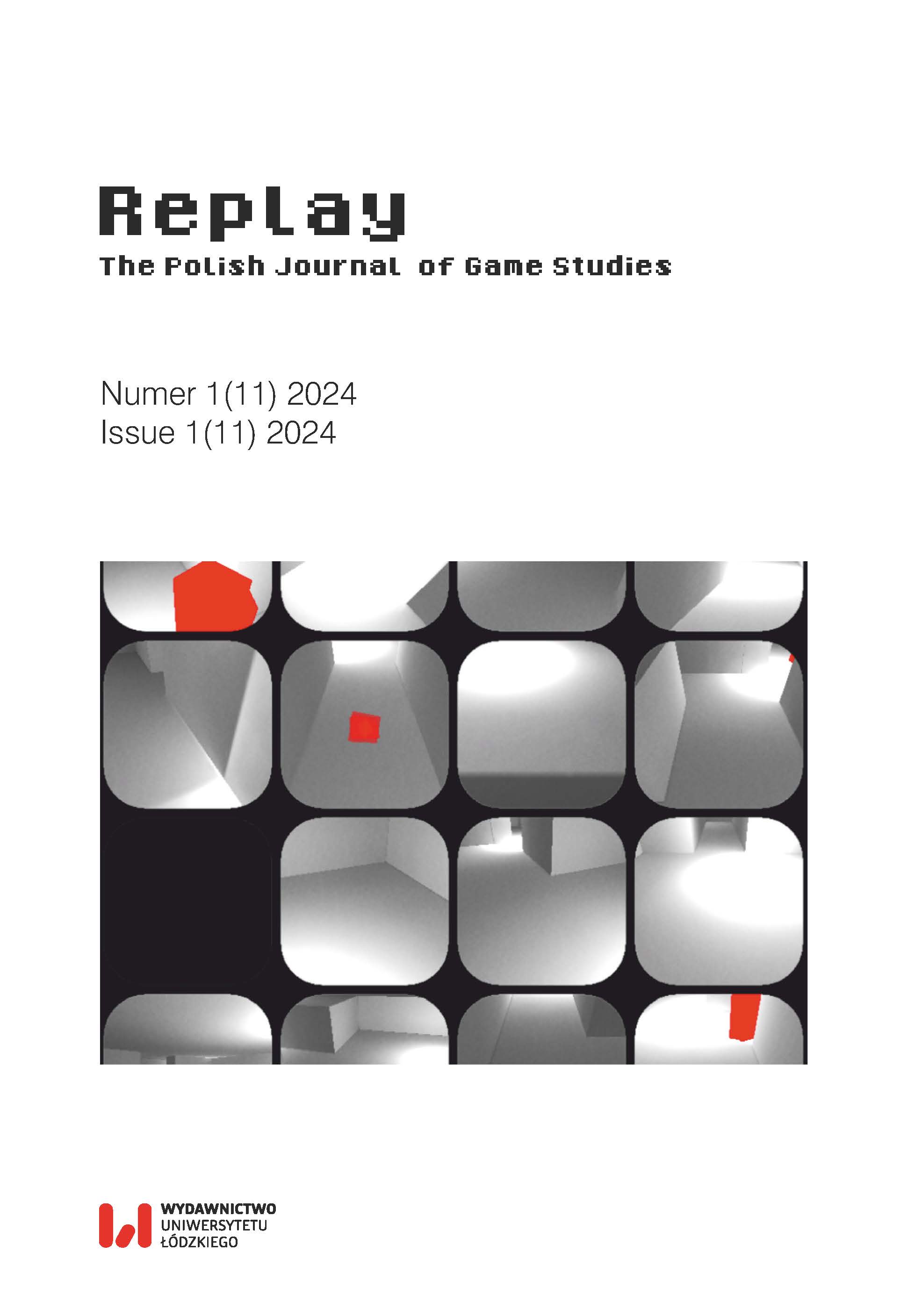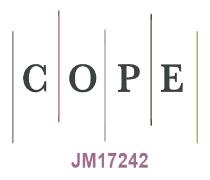Cozy Games and Resistance Through Care
DOI:
https://doi.org/10.18778/2391-8551.11.01Bibliografia
Abdul Hadi, S. (2017). Struggle and the Politics of Self Care: A Curatorial Perspective. [Unpublished doctoral dissertation.] Concordia University.
Google Scholar
Alharthi, S.A., Alsaedi, O., Toups, Z.O., Tanenbaum, J., & Hammer, J. (2018). Playing to Wait: A Taxonomy of Idle Games. In: Proceedings of the 2018 CHI Conference on Human Factors in Computing Systems. ACM.
Google Scholar
DOI: https://doi.org/10.1145/3173574.3174195
Baudinette, T. (2017). Constructing Identities on a Japanese Gay Dating Site: Hunkiness, Cuteness and the Desire for Heteronormative Masculinity. Journal of Language and Sexuality, 6(2), 232–261. https://doi.org/10.1075/jls.6.2.02bau
Google Scholar
DOI: https://doi.org/10.1075/jls.6.2.02bau
Boltz, L.O., Henriksen, D., & Mishra, P. (2015). Rethinking Technology & Creativity in the 21st Century: Empathy through Gaming – Perspective Taking in a Complex World. TechTrends, 59(6), 3–8. https://doi.org/10.1007/s11528-015-0895-1
Google Scholar
DOI: https://doi.org/10.1007/s11528-015-0895-1
Campbell, M. (2018, July 16). Too Pure For This World. Kill Your Darlings. Online: https://www.killyourdarlings.com.au/article/too-pure-for-this-world/ (accessed on December 22, 2023).
Google Scholar
Chan, L., Chandross D., Cober, S., & Lachman, R. (2022). TOMO VOX: Exploring Cozy Games and Character-Driven Storyworlds for Pediatric Voice Therapy. In: Extended Abstracts of the 2022 Annual Symposium on Computer-Human Interaction in Play (pp. 127–132).
Google Scholar
DOI: https://doi.org/10.1145/3505270.3558352
Code, B. (2017, March 8). Slouching toward Relevant Video Games. GamesIndustry.biz. Online: https://www.gamesindustry.biz/slouching-toward-relevant-videogames (accessed on December 22, 2023).
Google Scholar
Dale, J.P., Leyda, J., Negra, D., McIntyre, A.P., & Goggin, J. (2016). The Aesthetics and Affects of Cuteness. In: J.P. Dale, J. Leyda, D. Negra, A.P. McIntyre, & J. Goggin (Eds.), The Aesthetics and Affects of Cuteness (pp. 1–34). Routledge.
Google Scholar
DOI: https://doi.org/10.4324/9781315658520
DeAngelis, M. (2016). Soft and Hard: Accessible Masculinity, Celebrity, and Post-Millennial Cuteness. In: J.P. Dale, J. Leyda, D. Negra, A.P. McIntyre, & J. Goggin (Eds.), The Aesthetics and Affects of Cuteness (pp. 204–225). Routledge.
Google Scholar
Fang, Z. (2023). Cozy Games: How COVID-19 Affected Game Playing Among College Students. [Unpublished doctoral dissertation.] The George Washington University.
Google Scholar
Farca, G., Lehner, A., & Navarro-Remesal, V. (2018). Regenerative Play and the Experience of the Sublime in The Legend Of Zelda: Breath Of The Wild. The Philosophy of Computer Games Conference.
Google Scholar
Fizek, S. (2018). Interpassivity and the Joy of Delegated Play in Idle Games. Transactions of the Digital Games Research Association, 3(3). https://doi.org/10.26503/todigra.v3i3.81
Google Scholar
DOI: https://doi.org/10.26503/todigra.v3i3.81
Hamington, M. (2004). Embodied Care: Jane Addams, Maurice Merleau-Ponty, and Feminist Ethics. University of Illinois Press.
Google Scholar
Harrington, J. (2018). On Buddhist Frogs and Flower Arrangements: Out-of-Game’s Spatial Production in Friendship Games. Game Studies Triple Conference.
Google Scholar
Held, V. (2006). The Ethics of Care: Personal, Political, and Global. Oxford University Press.
Google Scholar
DOI: https://doi.org/10.1093/0195180992.001.0001
Hernandez, P. (2020, August 6). Animal Crossing outsells Breath of the Wild in mere months. Polygon. Online: https://www.polygon.com/2020/8/6/21356899/animalcrossing-new-horizons-acnh-nintendo-switch-financial-earnings-sales-breathof-the-wild (accessed on December 22, 2023).
Google Scholar
Hersey, T. (2022). Rest Is Resistance: A Manifesto. Little Brown Spark.
Google Scholar
Hjorth, L. & Richardson, I. (2020). Ambient Play. The MIT Press.
Google Scholar
DOI: https://doi.org/10.7551/mitpress/12422.001.0001
Khan, I. (2020, April 7). Why Animal Crossing Is the Game for the Coronavirus Moment. The New York Times. Online: https://www.nytimes.com/2020/04/07/
Google Scholar
arts/animal-crossing-covid-coronavirus-popularity-millennials.html (accessed on December 22, 2023).
Google Scholar
Kinsella, S. (2015). Adult Manga: Culture and Power in Contemporary Japanese Society. Routledge.
Google Scholar
DOI: https://doi.org/10.4324/9780203347140
Knight, A. (2019). Reap What You Sow: The Seed and the Harvest of Wholesome Games. The Lifted Brow, (44), 5–8.
Google Scholar
Kors, M.J.L., Ferri, G., van der Spek, E.D., Ketel, C., & Schouten, B.A.M. (2016). A Breathtaking Journey: On the Design of an Empathy-Arousing Mixed-Reality Game. In: Proceedings of the 2016 Annual Symposium on Computer-Human Interaction in Play – CHI PLAY ’16, (pp. 91–104). ACM Press. https://doi.org/10.1145/2967934.2968110
Google Scholar
DOI: https://doi.org/10.1145/2967934.2968110
Lorde, A. (2017). A Burst of Light: And Other Essays. Courier Dover Publications.
Google Scholar
Lorenz, K. (1970). Studies in Animal and Human Behaviour. Volume I. Harvard University Press.
Google Scholar
DOI: https://doi.org/10.4159/harvard.9780674430389
McCrea, C. (2011). We Play in Public: The Nature and Context of Portable Gaming Systems. Convergence, 17(4), 389–403. https://doi.org/10.1177/1354856511414987
Google Scholar
DOI: https://doi.org/10.1177/1354856511414987
Navarro-Remesal, V. (2020). Meditaciones. Modos zen, contemplación y lentitud en el videojuego. In: V. Navarro-Remesal (Ed.), Pensar el juego. 25 caminos para los game studies (pp. 132–140). Shangrila.
Google Scholar
Philips, J. (2007). Care. Polity Press.
Google Scholar
Reay, E. (2021). Cute, Cuddly and Completely Crushable: Plushies as Avatars in Video Games. Journal of Gaming & Virtual Worlds, 13(2), 131–149. https://doi.org/10.1386/jgvw_00033_1
Google Scholar
DOI: https://doi.org/10.1386/jgvw_00033_1
Reay, E. (2022). The Child in Games: From the Meek, to the Mighty, to the Monstrous. [Unpublished doctoral dissertation.] University of Cambridge.
Google Scholar
Robinson, F. (1999). Globalizing Care: Ethics, Feminist Theory, and International Relations. Westview Press.
Google Scholar
Ruberg, B. & Scully-Blaker, R. (2021). Making Players Care: The Ambivalent Cultural Politics of Care and Video Games. International Journal of Cultural Studies, 24(4), 655–672. https://doi.org/10.1177/1367877920950323
Google Scholar
DOI: https://doi.org/10.1177/1367877920950323
Sherman, G.D. & Haidt, J. (2011). Cuteness and Disgust: The Humanizing and Dehumanizing Effects of Emotion. Emotion Review, 3(3), 245–251. https://doi.org/10.1177/1754073911402396
Google Scholar
DOI: https://doi.org/10.1177/1754073911402396
Short, T.X., Ordon, A., Hurd, D., Howe, C., Forbes, J., Eiserloh, S., Diaz, J., Cook, D., & Meiners, R. (2018, January 24). Cozy Games. Lostgarden. Online: https://lostgarden.home.blog/2018/01/24/cozy-games/ (accessed on December 22, 2023).
Google Scholar
Spicer, A. (2019, August 21). ‘Self-Care’: How a Radical Feminist Idea Was Stripped of Politics for the Mass Market. The Guardian. Online: https://www.theguardian.com/commentisfree/2019/aug/21/self-care-radical-feminist-idea-mass-market (accessed on December 22, 2023).
Google Scholar
Sullivan, A., Stanfill, M., & Salter, A. (2023). The Constraints of Cozy Games: Boyfriend Dungeon and Consent in Queer Play: Boyfriend Dungeon and Consent in Queer Play. In: Proceedings of the 18th International Conference on the Foundations of Digital Games (pp. 1–9).
Google Scholar
DOI: https://doi.org/10.1145/3582437.3582452
Thompson, J. (2015). Towards an Aesthetics of Care. Research in Drama Education: The Journal of Applied Theatre and Performance, 20(4), 430–441. https://doi.org/10.1080/13569783.2015.1068109
Google Scholar
DOI: https://doi.org/10.1080/13569783.2015.1068109
Wäppling, A., Walchshofer, L., & Lewin, R. (2022). What Makes a Cozy Game?: A Study of Three Games Considered Cozy. [Unpublished Bachelor’s dissertation.]
Google Scholar
Waszkiewicz, A., Bakun, M. (2020). Towards the Aesthetics of Cozy Video Games. Journal of Gaming & Virtual Worlds, 12(3), 225–240. https://doi.org/10.1386/jgvw_00017_1
Google Scholar
DOI: https://doi.org/10.1386/jgvw_00017_1
Yano, C.R. (2004). Kitty Litter: Japanese Cute at Home and Abroad. In: J. Goldstein, D. Buckingham, & G. Brougere (Eds.). Toys, Games, and Media (pp. 67–84). Routledge. https://doi.org/10.4324/9781410611000
Google Scholar
DOI: https://doi.org/10.4324/9781410611000-11
Yee, A.Z.H. & Sng, J.R.H. (2022). Animal Crossing and COVID-19: A Qualitative Study Examining How Video Games Satisfy Basic Psychological Needs during the Pandemic. Frontiers in Psychology, 13. https://doi.org/10.3389/fpsyg.2022.800683
Google Scholar
DOI: https://doi.org/10.3389/fpsyg.2022.800683
Youngblood, J. (2022). A Labor of (Queer) Love: Maintaining ‘Cozy Wholesomeness’ on Twitch During COVID-19 and Beyond. Television & New Media, 23(5), 531–541. https://doi.org/10.1177/15274764221080966
Google Scholar
DOI: https://doi.org/10.1177/15274764221080966
Zhu, L. (2021). The Psychology behind Video Games during COVID-19 Pandemic: A Case Study of Animal Crossing: New Horizons. Human Behavior and Emerging Technologies, 3(1), 157–159. https://doi.org/10.1002/hbe2.221
Google Scholar
DOI: https://doi.org/10.1002/hbe2.221
Coldwood Interactive. (2016). Unravel. Electronic Arts.
Google Scholar
ConcernedApe. (2016). Stardew Valley. ConcernedApe.
Google Scholar
Crystal Dynamics. (2013). Tomb Raider. Square Enix.
Google Scholar
From Software. (2011). Dark Souls. Bandai Namco Entertainment.
Google Scholar
Max Inferno. (2022). A Little to the Left. Secret Mode.
Google Scholar
Media Molecule. (2014). Little Big Planet. Sony Interactive Entertainment.
Google Scholar
Mediatonic. (2020). Fall Guys. Epic Games.
Google Scholar
Monomi Park. (2017). Slime Rancher. Monomi Park.
Google Scholar
Naughty Dog. (2016). Uncharted 4: A Thief’s End. Sony Computer Entertainment.
Google Scholar
NeoNoir Studios. (2024). Cozynauts. NeoNoir Studios.
Google Scholar
Nintendo. (2020). Animal Crossing: New Horizons. Nintendo.
Google Scholar
Numinous Games. (2016). That Dragon, Cancer. Numinous Games.
Google Scholar
Phoenix Labs. (2023). Fae Farm. Phoenix Labs.
Google Scholar
Witch Beam. (2021). Unpacking. Humble Games.
Google Scholar
Pobrania
Opublikowane
Jak cytować
Numer
Dział
Licencja

Utwór dostępny jest na licencji Creative Commons Uznanie autorstwa – Użycie niekomercyjne – Bez utworów zależnych 4.0 Międzynarodowe.










